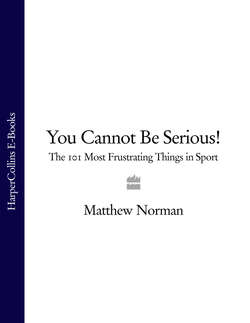Читать книгу You Cannot Be Serious!: The 101 Most Frustrating Things in Sport - Matthew Norman - Страница 18
Оглавление89
Pelé
If Pelé had shown the same talent with his feet as he has exhibited since retiring with his mouth, he would have been, at best, Emile Heskey. Never has the old saw that former sportsmen should be neither seen nor heard been more perfectly illustrated – and that includes such fellow entrants in this work as Mark Lawrenson, Sue Barker, Sebastian Coe and even Kriss Akabusi.
Genius that he was on the pitch, off it he struggles to make the cut as a half-wit. You can barely wade through five pages of his autobiography without encountering a variant of ‘Once again, my business judgement sadly betrayed me.’ So it was that money troubles obliged him to advertise Viagra, thereby betraying our memories of the wonderfully lithe, natural seventeen-year-old striking talent who devastated Sweden in the 1958 World Cup final, and later electrified the 1970 tournament. The last thing you want from a sporting god is the image of him struggling with flaccidity.
The same talent for misjudgement that caused his frequent flirtations with bankruptcy (you could sell him a batch of $103 bills for twice their face value) extends to his reading of the one thing he might be expected to know a little about. As a football pundit, Pelé is barely less mythical a figure than he once was in the yellow and blue of Brazil. Romario, a successor as leader of the Brazilian attack, once said, ‘Pelé is a poet when he keeps his mouth shut,’ while the World Cup-winning coach and briefly manager of Chelsea Luiz Felipe Scolari chipped in with this little gem: ‘I believe Pelé knows nothing about football. His analysis always turns out to be wrong. If you want to win a title, you have to listen to Pelé and then do the opposite.’
The Sadim of football punditry (like Midas in reverse, everything he touches turns to lead) has made too many sensationlly daft predictions for them all to be catalogued here, so we must confine ourselves to a few favourites.
Pelé’s pick for the 1994 World Cup was Colombia. Suffice it to say that the Colombian defender Andrés Escobar had been shot dead in a Medellin car park before the final was played. In 1998 he went for Norway. Norway. Four years later, the scorer of more than 1,000 career goals studied the World Cup field, and plumped – I’m not making this up – for England. To repeat, that’s England. E.N.G.L.A.N.D.
Over his insistence, long ago, that Nicky Barmby would become a player of unarguably world class, and his categorical statement that an African nation would win the World Cup before the year 2000, let us lightly pass. Perhaps the highlight of highlights from the mouth of this soothsayer of soothsayers was his contemptuous dismissal of his own country’s chances in 2002 (the year, you may recall, he predicted an England victory). Brazil, insisted Pelé, would not survive the group stage. How tantalisingly close the team came to fulfilling his expectation, as they became the first country ever to win all seven games in normal time en route to lifting the Jules Rimet Trophy.
Whoever would have believed back in 1986 that of the two players universally acknowledged, then as now, as the greatest of all time, it would be Diego Maradona – much too adorably deranged nowadays to warrant an entry of his own in this volume – who went on to become the more beloved, and Pelé who would establish himself, even in football, as the imbecile’s imbecile? If only there were a Viagran equivalent for a limp and lifeless brain.
